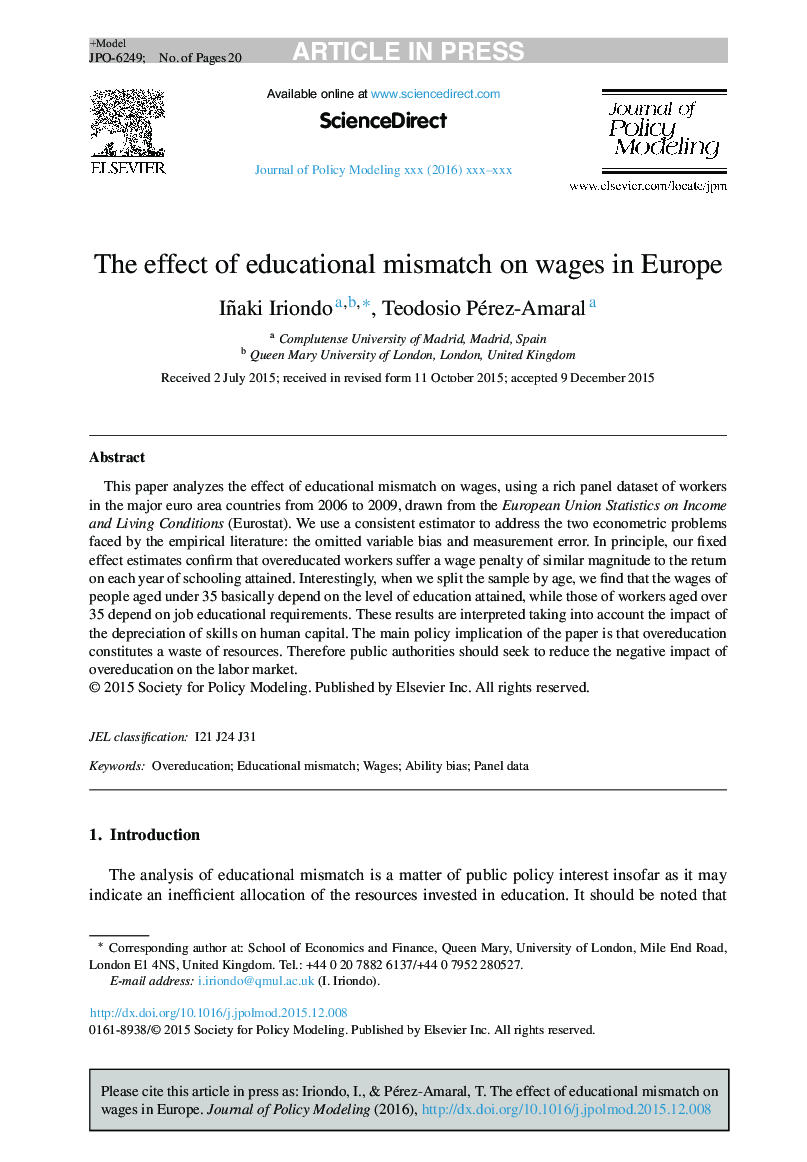| کد مقاله | کد نشریه | سال انتشار | مقاله انگلیسی | نسخه تمام متن |
|---|---|---|---|---|
| 10479087 | 931499 | 2016 | 20 صفحه PDF | دانلود رایگان |
عنوان انگلیسی مقاله ISI
The effect of educational mismatch on wages in Europe
ترجمه فارسی عنوان
اثر عدم تعادل آموزشی بر دستمزدها در اروپا
دانلود مقاله + سفارش ترجمه
دانلود مقاله ISI انگلیسی
رایگان برای ایرانیان
کلمات کلیدی
ترجمه چکیده
این مقاله اثر تأثیر ناسازگاری آموزشی بر دستمزدها را با استفاده از مجموعه داده های پانل غنی کارگران در کشورهای بزرگ منطقه یورو از سال 2006 تا 2009، که از آمار اتحادیه اروپا درآمد و شرایط زندگی (یورواستات) گرفته شده است، تحلیل می کند. ما از برآوردگر سازگار برای مقابله با دو مسئله اقتصادسنجی که با ادبیات تجربی مواجه شده اند استفاده می کنیم: بی توجهی متغیر حذف شده و خطای اندازه گیری. در اصل، برآوردهای ثابت ثابت ما را تأیید می کنند که کارگران تحصیل کرده با رشوه دادن به حقوق بازنشستگی برابر با بازده هر ساله تحصیلی رنج می برند. جالب توجه است، هنگامی که ما نمونه را با سن تقسیم می کنیم، متوجه می شویم که دستمزد افراد زیر 35 سال به طور عمده به سطح تحصیلات بستگی دارد، در حالی که کارگران بالای 35 سال به شرایط آموزشی شغلی بستگی دارند. این نتایج با در نظر گرفتن تاثیر استهلاک مهارت ها بر سرمایه انسانی تفسیر می شود. پیروی از سیاست اصلی این مقاله این است که تحصیلات عالی، منبعی از منابع است. بنابراین، مقامات دولتی باید تلاش کنند تا تاثیر منفی تحصیل در بازار کار را کاهش دهند.
موضوعات مرتبط
علوم انسانی و اجتماعی
اقتصاد، اقتصادسنجی و امور مالی
اقتصاد و اقتصادسنجی
چکیده انگلیسی
This paper analyzes the effect of educational mismatch on wages, using a rich panel dataset of workers in the major euro area countries from 2006 to 2009, drawn from the European Union Statistics on Income and Living Conditions (Eurostat). We use a consistent estimator to address the two econometric problems faced by the empirical literature: the omitted variable bias and measurement error. In principle, our fixed effect estimates confirm that overeducated workers suffer a wage penalty of similar magnitude to the return on each year of schooling attained. Interestingly, when we split the sample by age, we find that the wages of people aged under 35 basically depend on the level of education attained, while those of workers aged over 35 depend on job educational requirements. These results are interpreted taking into account the impact of the depreciation of skills on human capital. The main policy implication of the paper is that overeducation constitutes a waste of resources. Therefore public authorities should seek to reduce the negative impact of overeducation on the labor market.
ناشر
Database: Elsevier - ScienceDirect (ساینس دایرکت)
Journal: Journal of Policy Modeling - Volume 38, Issue 2, MarchâApril 2016, Pages 304-323
Journal: Journal of Policy Modeling - Volume 38, Issue 2, MarchâApril 2016, Pages 304-323
نویسندگان
Iñaki Iriondo, Teodosio Pérez-Amaral,
